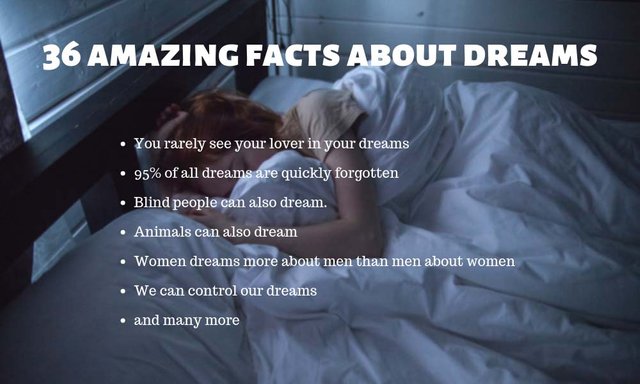Dreams!!!
We all have them; some are better than others, and the most are better left forgotten. A dream is a collection of ideas, images, and sensations that occur in a person's mind while sleeping. In old English, the word dream meant melody. Dreams may be odd things. Many people believe that dreams are simply your brain putting together the random fragments of the previous day. But what if our dreams were more than that? We have 36 unique and strange dream facts for you.

You rarely see your partner in your dreams.
Our dreams are only about what we already know.
The faces we see in our dreams are the same as the faces we have seen in real life.
95% of all dreams are immediately forgotten after waking up.
Although around 80% of all dreams are in color, a small proportion of persons claim to only dream in black and white.
We have power over our fantasies.
A lucid dream occurs when a dreamer becomes aware that they are in a dream and so gets control over everything that occurs.
Dreams are more frequently associated with unpleasant feelings such as anxiety and terror.
Blind individuals can also dream.
Blind people's dreams frequently include information from other senses, such as taste, music, and touch.
We are paralyzed in our dreams. The condition is known as REM atonia.
Many dreams are common and universal. School activities, feeling frozen, unable to move, arriving late, being chased, attached, and falling are all common dreams.
The average person has 1460 to 2190 dreams per year.
We cannot snore and dream at the same time.
Women are known to have slightly longer dreams than males.
When you sleep, your brain is more busy than when you are awake.
Babies do not dream about themselves till they are three or four years old.
Our bodies burn more calories while sleeping than they do during the day.
Men have an erection while sleeping in REM (rapid eye movements).
We cannot read in our dreams because dreaming and reading require separate parts of the brain.
In an average lifespan, we spend 6 years dreaming.
You can solve problems in your dreams.
Negative dreams are more likely than happy dreams.
Animals can dream as well.
A typical dream lasts 10 to 15 minutes.
Individuals who remain up late at night are more likely to experience nightmares.
The colder your place, the worse your dreams.
Occasionally, we hear a sound from reality and incorporate it into our dreams.
The average person has four dreams per night.
Pregnant women remember their dreams better than other groups. This is primarily owing to the severe hormonal changes that occur during pregnancy.
In a dream, flying might represent personal power, joy, and freedom.
Premonition dreams- an instance in which people had dreams about things that later happened to them in the exact same way they had dreamed about it.
When a man sleeps, almost 70% of the persons he sees in his dream are also men.
When a woman sleeps, men and women share the dream in roughly equal proportions.
People with personality disorders are unable to dream.
Nightmares are increasingly prevalent.